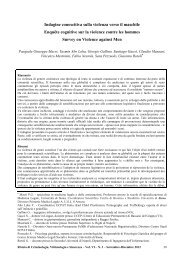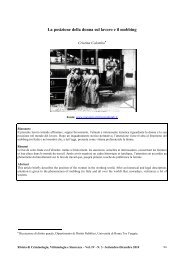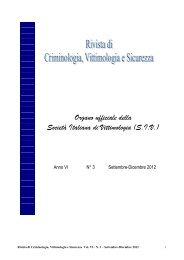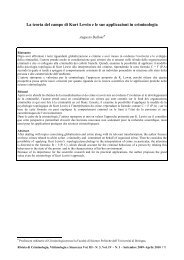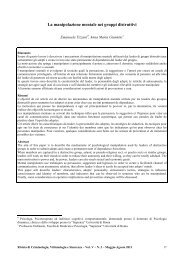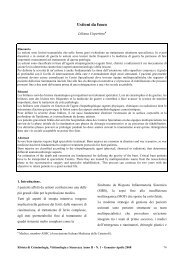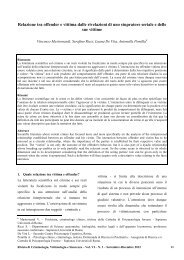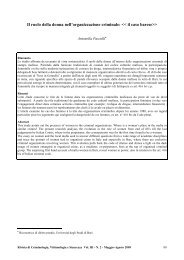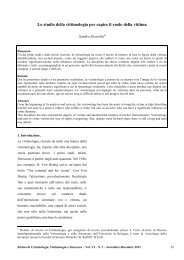Globalization, Transnational Crime and State Power ... - Vittimologia
Globalization, Transnational Crime and State Power ... - Vittimologia
Globalization, Transnational Crime and State Power ... - Vittimologia
Create successful ePaper yourself
Turn your PDF publications into a flip-book with our unique Google optimized e-Paper software.
A. <strong>Globalization</strong>: a process affecting everyone.<br />
The lives of everyone today, <strong>and</strong> particularly our<br />
consuming habits, have becoming more <strong>and</strong> more<br />
globalized. <strong>Globalization</strong> has become an everyday<br />
world but is a phenomenon of considerable<br />
relevance, of great significance 1 <strong>and</strong> touches upon<br />
several larger issues <strong>and</strong> problems like inequality<br />
between countries, between North <strong>and</strong> South,<br />
inequalities of social class <strong>and</strong> genders,<br />
democratization <strong>and</strong> international relations. It also<br />
generates strong negative reactions <strong>and</strong> even<br />
criminal acts of opposition to it. 2<br />
<strong>Globalization</strong><br />
also touches on crime, crime policy <strong>and</strong> their<br />
effects on society. It. has been aptly described as<br />
“compressing” 3 <strong>and</strong> making the world “smaller,”<br />
typified by the substantial <strong>and</strong> quickening<br />
progress in the transportation, communication,<br />
1 See J. D. Sachs, <strong>Globalization</strong> <strong>and</strong> the Rule of Law<br />
(Yale Law School Occasional Papers, Second Series,<br />
Number 4, 1998); see also C. Francois, El Camino de<br />
la Globalizacion: Una Vision Sistemica, 5, 1999; W.<br />
Twining, Globalisation <strong>and</strong> Legal Theory, 7, 2000.<br />
2 An example of a target of anti-globalization efforts is<br />
the controversial <strong>and</strong> popular institution of McDonald's<br />
in France, which is loved <strong>and</strong> hated to the point of<br />
occasionally provoking a national crisis as well as a<br />
number of social conflicts <strong>and</strong> criminal prosecutions in<br />
recent years. McDonald's has exp<strong>and</strong>ed rapidly in<br />
France with over 1,100 outlets in the country, making it<br />
the most profitable subsidiary in Europe. McDonald’s<br />
has aroused both political opposition <strong>and</strong> opposition in<br />
the workplace, which takes the form of a struggle<br />
against working conditions, the conception of McWork<br />
<strong>and</strong> McManagement. The opposition is often justified<br />
or explained in terms of resistance to<br />
“Americanization” <strong>and</strong> globalization. Jose Bove, the<br />
Farmers' Confederation firebr<strong>and</strong>, led a strong anti-<br />
McDonald’s campaign in the south of France a few<br />
years ago <strong>and</strong> partially destroyed a “McDo” in Millau<br />
with a tractor. Brittany separatists bombed a<br />
McDonald's in 2000, killing a young French woman<br />
employee. In bitter backlash, thous<strong>and</strong>s rallied outside<br />
the Breton regional parliament to protest the death. See<br />
also M. Debouzy, “Working for McDonald's, France:<br />
Resistance to the Americanization of Work”,<br />
International Labor <strong>and</strong> Working-Class History, 70,<br />
2006, pp. 126-142.<br />
<strong>and</strong> information sharing areas. Seen in a historical<br />
perspective, globalization is the natural outcome<br />
of a process that began centuries ago <strong>and</strong> that<br />
advanced through several major technological<br />
innovations, some of which, like the telegraph,<br />
have already become obsolete while others, like<br />
the internet, are constantly growing <strong>and</strong> morphing<br />
into new forms <strong>and</strong> applications. 4 In the economic<br />
sphere, there have also been major changes like<br />
the rapid expansion of commercial <strong>and</strong> financial<br />
instruments <strong>and</strong> markets <strong>and</strong> the speed, ease <strong>and</strong><br />
privacy with which these transactions are now<br />
being conducted. There is not question that a<br />
borderless global economy has been created <strong>and</strong> is<br />
exp<strong>and</strong>ing 5 . Thus, globalization can be described<br />
as "the closer integration of countries <strong>and</strong> peoples<br />
of the world which has been brought about by the<br />
enormous reduction of costs of transportation <strong>and</strong><br />
communication, <strong>and</strong> the breaking down of<br />
artificial barriers to the flows of goods, services,<br />
capital, knowledge, <strong>and</strong> (to a lesser extent) people<br />
across borders" 6 . Cheaper transportation <strong>and</strong><br />
communication play a big role in making<br />
globalization possible <strong>and</strong> successful.<br />
<strong>Globalization</strong> increases the velocity of<br />
interactions. Thus, transnational activity takes<br />
place faster, more easily, <strong>and</strong> more often than in<br />
the past. Vast numbers of people can now do very<br />
3<br />
R. Robertson, <strong>Globalization</strong>: Social Theory <strong>and</strong><br />
Global Culture, 8-32, 1992.<br />
4 E. Rotman, “The globalization of criminal violence”,<br />
Cornell J. L. & Pub, 10, Fall 2000.<br />
5 See generally M. Hardt & A. Negri, “<strong>Globalization</strong> as<br />
Empire”, in D. Held & A. McGrew (eds), The Global<br />
Transformations Reader, 2000, pp. 116-117; A.<br />
McGrew, “Models of <strong>Transnational</strong> Democracy”, in D.<br />
Held & A. McGrew (eds), The Global Transformations<br />
Reader, 2000, pp. 500-05.<br />
6 J. E. Stiglitz, “<strong>Globalization</strong> <strong>and</strong> Its Discontents”, 9,<br />
2002.<br />
Rivista di Criminologia, <strong>Vittimologia</strong> e Sicurezza Vol. III - N. 3, Vol. IV – N. 1 – Settembre 2009–Aprile 2010 64



